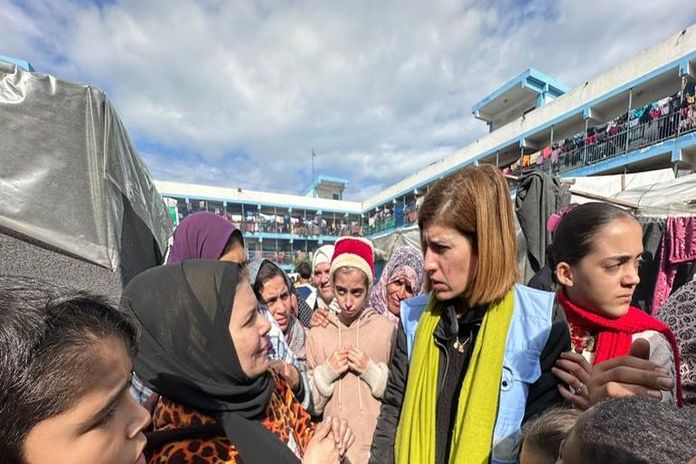GAZA, CITY, Gaza – In Gaza, bombs and bullets are far from the only threat to life. Residents lack food and clean water, health facilities are practically nonexistent and communication with the outside world is patchy at best.
That’s according to Juliette Touma, director of communications for UNRWA, the UN Agency for Palestine Refugees, who spoke in depth to UN News’s Conor Lennon on Monday about her most recent visit to the Strip.

The interview has been edited for clarity and length.
“This was my second trip since the war began. I try to go whenever it’s possible to express solidarity with the people there who are severely impacted by this brutal war and also to see our colleagues who continue to serve the communities through their humanitarian mission.
This time, however, I visited the middle areas, including Deir al-Balah, and then in the south, I went to Rafah and Khan Younis.
It was absolutely desperate. Wherever you looked, there were people who are displaced, people asking for assistance, and people were just very, very exhausted and tired after three and a half months of what has been a very brutal war.
I think that what was different to the first visit I took is how congested a city like Rafah has become.
Makeshift shelters
The population of Rafah in the south has quadrupled since the war began. People kept fleeing, looking for shelter in that part of Gaza, in the hope that they will find safety and protection.
Wherever you drove, wherever you walked, wherever you looked, the city was covered with these little structures that people who fled to the area have set up. They’re very basic, just a couple of wooden poles covered with plastic sheeting. That’s all people can find, and these have become home to many, many people.
These are not conditions meant for human beings’
I spoke to one mother who was living in one of those informal structures. There were 26 people living on top of each other in a small space, less than three square metres.
She was carrying two of her kids, and she told me that they have no way to stay warm at night, that they were frustrated, that they are tired of this life.
She said that, in terms of assistance, she only had one piece of vegetable to be shared between the 26 people. She told me that she cannot wash; either the queues are too long or the showers don’t work.
These are not conditions meant for human beings.
Total communication blackouts
Since the beginning of the war, phone and internet services have been cut several times, leading to total communication blackouts, but this has been the longest [still ongoing at time of publication] telecommunications blackout that Gaza has had since the war began. This is due, I understand, to severe damage that was done to the telecoms network in the southern part of the Gaza Strip.
When I was there, you couldn’t even send a simple WhatsApp message, and you could forget about trying to place a call from one mobile phone to another.
The majority of people feel extremely isolated from each other and the rest of the world. This also contributes to a lack of safety.
Imagine, you’re in the middle of a war zone, and you need to call an ambulance. Or you want to call for help, check on your loved ones. You simply cannot do it.
The other impact this has is on our own aid operation, whether it’s UNRWA, the UN system or the humanitarian organizations in general, because it is, as one can imagine, very challenging to coordinate. You need to be able to call truck drivers and to organize with those who do the loading, the off-loading, the storing and the distribution. A phone is absolutely indispensable.
Humanitarian ceasefire, now
So, right now, we are continuing to call for a humanitarian ceasefire to bring respite and calm not only to people in Gaza, but the people across the region.
Meanwhile, there is a need for more humanitarian supplies, including medicines for chronic diseases, which are in very short supply at the moment.
That is why we said, after the trip to Gaza, that the siege is the silent killer of people in Gaza. People are likely dying as a result of hunger, disease or a lack of medical and health care.
And then what also needs to happen is more commercial supplies should come to the private sector in the Gaza Strip because the entire population almost entirely now is relying on humanitarian assistance, and that’s not sustainable, not in the medium term and not in the long term.”





